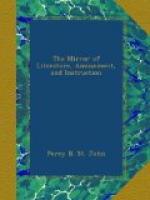[The elegantly embellished volumes by Mrs. Jamieson, with the above attractive title, present the prettiest code of ladye-philosophy we have ever witnessed on paper. They aim at illustrating the characters of Intellect, Passion, and Imagination, the Affections, and what are purely Historical Characters, in the females of Shakspeare’s Plays. Such is the design: of its beautiful execution we can give the reader but a faint idea by extracting from Passion and Imagination, part of the Character of Juliet:—]
It is not without emotion, that I attempt to touch on the character of Juliet. Such beautiful things have already been said of her—only to be exceeded in beauty by the subject that inspired them!—it is impossible to say any thing better; but it is possible to say something more. Such in fact is the simplicity, the truth, and the loveliness of Juliet’s character, that we are not at first aware of its complexity, its depth, and its variety. There is in it an intensity of passion, a singleness of purpose, an entireness, a completeness of effect, which we feel as a whole; and to attempt to analyze the impression thus conveyed at once to soul and sense, is as if while hanging-over a half-blown rose, and revelling in its intoxicating perfume, we should pull it asunder, leaflet by leaflet, the better to display its bloom and fragrance. Yet how otherwise should we disclose the wonders of its formation, or do justice to the skill of the divine hand that hath thus fashioned it in its beauty?
All Shakspeare’s women, being essentially women, either love, or have loved, or are capable of loving; but Juliet is love itself. The passion is her state of being, and out of it she has no existence. It is the soul within her soul; the pulse within her heart; the life-blood along her veins, “blending with every atom of her frame.” The love that is so chaste and dignified in Portia—so airy-delicate, and fearless in Miranda—so sweetly confiding in Perdita—so playfully fond in Rosalind—so constant in Imogem—so devoted in Desdemona—so fervent in Helen—so tender in Viola,—is each and all of these in Juliet. All these remind us of her; but she reminds us of nothing but her own sweet self: or if she does, it is of the Grismunda, or the Lisetta, or the Fiamminetta of Boccaccio, to whom she is allied, not in the character or circumstances, but in the truly Italian spirit, the glowing, national complexion of the portrait.[6]
[6] Lord Byron has remarked of the Italian women, (and he could speak avec connaissance de fait,) that they are the only women in the world capable of impressions at once very sudden and very durable; which, he adds, is to be found in no other nation. Mr. Moore observes afterwards, how completely an Italian woman, either from nature or her social position, is led to invert the usual course of frailty among ourselves, and weak in resisting the first impulses of passion, to reserve




